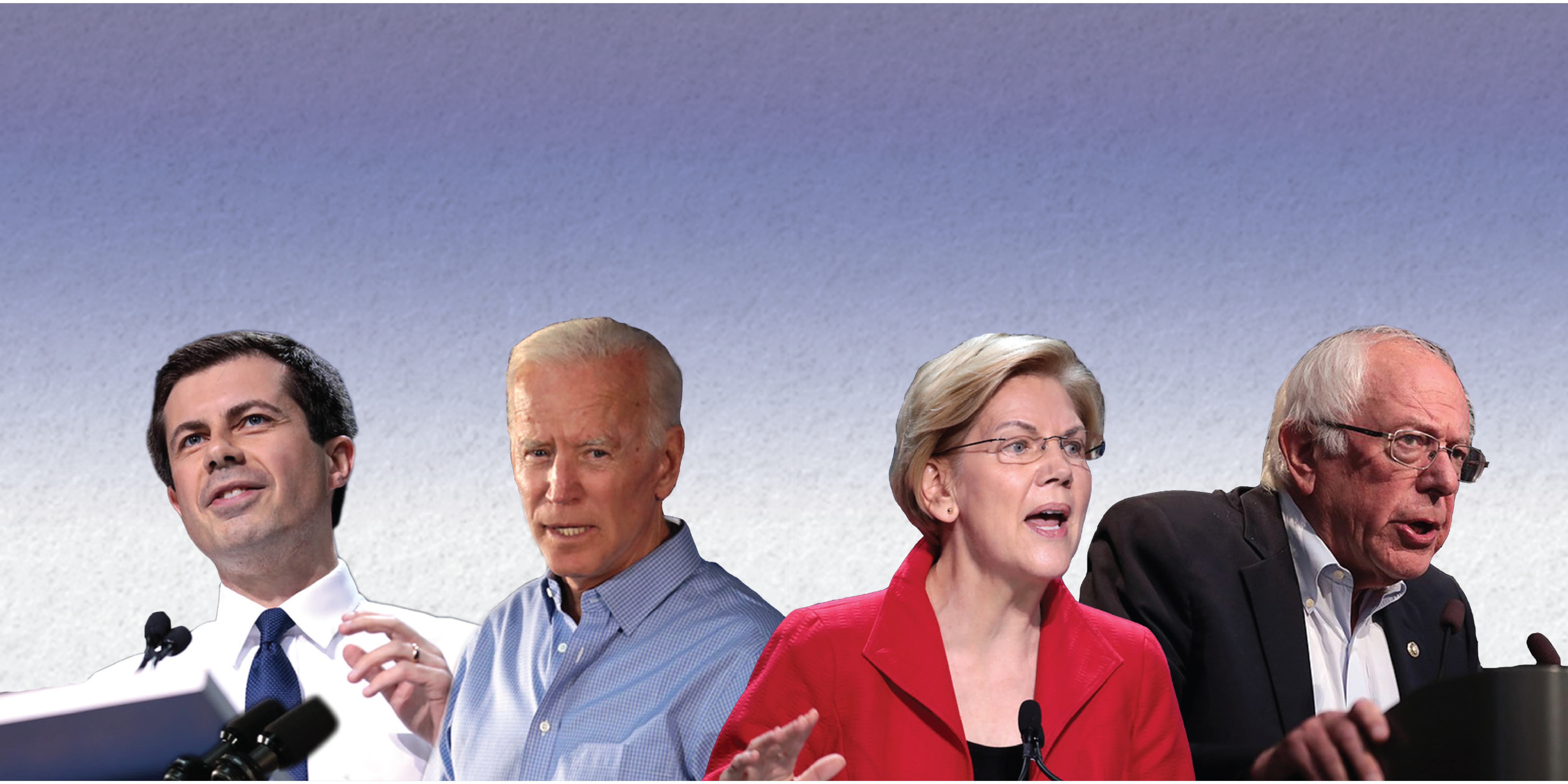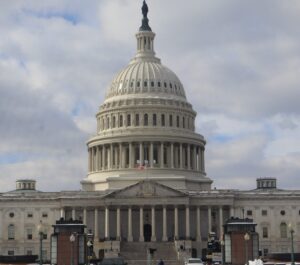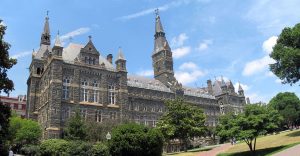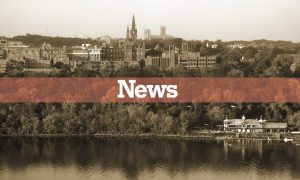Even in a political moment characterized by inter and intra party fighting, Mo Elleithee (SFS ’94) finds the wonder in politics. As director of the Georgetown Institute of Politics and Public Service, Elleithee is thrilled to engage the student body with the upcoming 2020 election. “I still find elections to be magical and watching as the voting actually begins, to see that sense of political community just continue to grow, is really what I’m looking forward to.”
At the time of publication, the much-anticipated Iowa Caucus is a mere three days away. In a campaign that more closely resembles The Hunger Games than a traditional election season, 28 Democrats and four Republicans, including President Donald Trump, made bids for the presidency in 2020. Now, with Iowa looming—the first stop on the road to the White House—12 Democrats and three Republicans remain.
For universities in the nation’s capital, it can be nearly impossible to avoid Washington politics. The infectious political spirit infuses into Georgetown’s culture, with a motivated student body across the ideological spectrum. When it comes to 2020, student groups have already begun backing their favorite candidates and forming their own coalitions on campus.
This isn’t the first presidential election for GU Politics. Founded in the fall of 2015, the institute provides opportunities for political and civic engagement on campus, increasing programming for students each year. Elleithee pointed to the Climate Forum hosted by the institute last September as a mark of the program’s growth. “Four years ago, we were lucky to get one presidential candidate to come to campus,” Elleithee said. “This year we had a two day long forum where we brought 12 presidential candidates.”
By bringing speakers to campus, hosting political events, and helping students register to vote, GU Politics holds an instrumental role in broadening political conversation on campus. Evidence of this lies in its programming for the 2020 election, starting with a journey to the Iowa Caucus.
The four-day-long Iowa Caucus trip is taking six students, along with GU Politics faculty, to Des Moines, Iowa. The students will meet with Iowans and national campaign staffers, attend campaign events, and observe precincts voting. To Elleithee, the value of the trip lies in illustrating how campaigns get out the vote. “So not just sitting down and talking to the strategists or seeing the candidates, but what are the field organizers doing in the final weekend?” he said.
Having never been to the Midwest, Grace Shevchenko (SFS ’22) will venture to Iowa, observing the caucus unfold in real time. Shevchenko, a Republican with no vested interest in any particular candidate, believes witnessing the caucus offers her an opportunity to observe the functions of politics unclouded by partisanship. Despite limited influence in the voting booth, the GU Politics trip will grant Shevchenko exposure into the behind-the-scenes action of the electoral process.
“I think it would be good to see it from a very objective standpoint without any personal interest because I actually can’t vote in the primaries since Pennsylvania is a closed primary,” she said. “So I literally have no weight in who will be the Democratic nominee.”
In actuality, the statewide caucus results do not directly translate into delegates, which are the votes necessary to win the Democratic nomination in July. Instead, Iowa partitions its delegates after the fact, based on the results of the caucuses at the county and congressional district level. “It’s also interesting because there’s no actual delegates that are awarded the night of the caucuses,” Shevchenko said. “So it’s kind of this big fanfare and pomp and circumstance that doesn’t actually amount to anything, technically.”
Despite this, the Iowa Caucus holds significant authority because of its timing. Historically, political experts believe the Iowa Caucuses sheds light on the direction of each respective party as they try to narrow down the candidate field. This rings true for the Democratic Party in its pursuit of a nominee to challenge Trump, assuming he is not removed from office by the Senate. As the first chance for Americans to affirm or deny presidential candidates at the ballot box, the caucus can reveal national trends and ignite momentum. “I think it’ll be interesting to see, kind of, who comes out on top in Iowa and then a few months down the lane, see who comes out overall,” Shevchenko said.
Even students not making the trek to Iowa can partake in the caucus. A week before the Iowa caucus, GU Politics hosted its second ever “mockus,” or a mock caucus, in order to educate students on how they work. Sen. Elizabeth Warren received the most votes at the mockus, with 52 students participating overall. On the night of the actual Iowa Caucus, the institute, along with the Georgetown Bipartisan Coalition, Georgetown College Republicans (GUCR) and the Georgetown College Democrats (GUCD)—will host a watch party. Lily Adams, a GU Politics Fellow and veteran of Sec. Hillary Clinton’s and Sen. Kamala Harris’ respective presidential campaigns, will offer interpretations of results as the campaign continues on to the New Hampshire primary.
With so many candidates still in the race, Chair of GUCD AJ Williamson (COL ’21) sees the spring semester as a way to foster a dialogue for Democrats on campus.
“There’s a lot of discourse happening between students supporting all different candidates. And so we’re hoping that GUCD can be a space for some of that dialogue,” Williamson said. “We’re planning on hosting conversations, hopefully in collaboration with some of those Hoyas for Warren, Hoyas for Pete, Hoyas for Bernie, etc., groups on campus to talk about some of the key issues that there might not be consensus on within the party.”
Williamson indicated that the club will focus on House and Senate races in 2020, while the party finalizes its presidential nominee.
Yet for some student-led groups, supporting one candidate is their entire objective. Specifically, as Williamson mentioned, the top four polling presidential candidates, Warren, Sen. Bernie Sanders, former Mayor Pete Buttigieg, and former Vice President Joe Biden, have generated student support on campus.
James Bond (SFS ’22), the logistics coordinator for Hoyas for Warren, reported that the group boasts nearly 200 subscribers to its email list. Sign-ups are growing as the primaries approach, Bond says, illustrating increased student enthusiasm around Warren and her message.
With political mobilization escalating in recent weeks, the Hoyas for Warren team participated in campaigning and activism efforts in Washington, phone-banking and working with the Warren campaign’s D.C. office. “There is an exciting amount of Hoyas passionate about Warren and the structural change she represents,” Bond wrote in an email to the Voice. “We have chosen to channel that energy and open up Hoyas for Warren’s leadership to whoever can commit their time and passion—a method of organizing which has been relatively successful.”
Sadie Morris (SFS ’22) spearheaded Hoyas for Bernie to support Sanders’s campaign. Her motivation came while home in California, where she started to consider the “urgency” of this political time. “As the fires in Australia stirred up images of my own hometown that caught on fire in 2018 and gave the world a startling glimpse at its impending future and as people around me suggested that a moderate, comforting presidential candidate is what the Democratic Party needed,” she wrote in an email to the Voice, “I felt like there must be something I could do while at school to help the only presidential candidate who has put forth an agenda at the scale and on the timeframe needed to confront the climate crisis.”
Following her realization, Morris and her friend hosted a Democratic Debate watch party, during which they hoped to gauge the level of Sanders’s support. At the party, people signed up to join a group message for Sanders supporters. Initially, the list included 12 members, but since its creation, the amount of students involved has more than doubled.
Morris wants to implement Sanders’s campaign strategy into her organization’s mission. That includes interacting with people of all political ideologies. “One of the guiding principles of Bernie’s campaign is to ‘talk to everyone—Bernie supporters and non-supporters alike,’” she wrote. “I would like this to be a big part of our organizing efforts too: facilitating conversations between students so people can make more informed voting decisions.”
Similar to Morris, Chris Hadsall (COL ’21), one of the campus coordinators for Hoyas for Pete, plans to spread the word about Buttigieg through individual dialogue. “A lot of folks are still getting to know Pete and the values he stands for, so we’re focusing on posting on social media, putting up flyers around campus, and showing up at GU Politics debates,” Hadsall wrote in an email to the Voice. “Talking to folks in person has really been pivotal as it allows us to convey the positive energy and hope exemplified by this campaign in a way that doesn’t always come across in print.”
With around five members of the organizing board and more phone banking volunteers, Hadsall professes his admiration for the Hoyas for Pete team. “Our core group of organizers is energized and organized in a way that continues to inspire me at every meeting.”
After watching all of the Democratic Debates, Sina Nemazi (COL ’21), leader of Hoyas for Biden, resonated with the candidate’s call for bipartisanship. “He talked about possibly running with a Republican. I don’t know if he actually considered doing that,” Nemazi said. “But I was like, that’s a really good way of coming together because I think that the problem of polarization and partisanship isn’t going to ever go away.”
At the heart of Biden’s message, Nemazi believes, is a call for national unity. “Every four years, we just try and fight, pull to the sides rather than just being like, OK, let’s just put this behind us,” he said. “Let’s just work together and understand each other and respect each other. And that’s the rhetoric I was kind of getting from his campaign.”
Although he founded Hoyas for Biden just last week, Nemazi’s advocacy dates back to around November 2019 as a member of Students for Biden, a national network. Through his involvement in that community, Nemazi has met prominent campaign staffers, including Biden’s wife, Jill. “Recently I went to a networking event with Dr. Jill Biden, and I met with one of the deputy political directors,” he said. “She put me in contact with the official head of students for Biden.”
Nemazi is currently vying to be the chair of Students for Biden in the D.C. area, a leadership position that would allow him to work with other local universities. His group, still in its early stages, has recruited two to three members thus far.
As of yet, no Georgetown student-organized group has been formed to support the president’s reelection effort, according to multiple sources, while there are individuals on campus who support him.
Whether students are starting their own group or working with GU Politics, Elleithee appreciates student political activism.“Seeing students, sort of, seize that opportunity and really get into it, and really ask interesting questions, and give their own ideas and walk away with their own analysis is something that I just love watching,” he said.
Henry Dai (SFS ’22), president of GUCR, plans to unite conservatives on campus during this year’s election. Although the Republican primary is not expected to be as contentious as its Democratic rival, Dai sees room for campus Republicans to participate in the campaign discourse. “As we get closer to the election this November, I also want to create opportunities for members to partake in the campaigning process, from local elections to the federal level,” Dai wrote in an email to the Voice. “It will be a fascinating election to watch, and my number one focus is to foster an environment for healthy discourse and active participation in politics.”
As leader of the club, Dai implores conservatives on campus to take part in GUCR in the build-up to the election. “This semester, my approach as president is to make our club a better resource for our members to find opportunities to learn and engage in politics,” he wrote. “My goal is to bring speakers from many corners of our party to bring new ideas and challenge existing ones. I hope this will best empower our club members to rise to be conservative leaders.”
GUCR has already announced campaign-related collaborations with GU Politics and GUCD, including the Iowa caucus watch party. Both GUCR and GUCD stressed the importance of bipartisanship leading up to November. The clubs’ collaboration marks a stark change from Elleithee’s college days. “Back when I was a student here during the 1992 presidential campaign, with Bill Clinton, College Dems and College Republicans had separate watch parties. And there was a friendly rivalry, but they were separate,” Elleithee said.
This division has mended over the years, especially since the establishment of GU Politics. “Since we’ve been here in 2016 and 2018, everyone kind of went in together for one big campus-wide election night watch party,” he said. “It was a lot of fun. It was just the spirit of civic engagement that everyone bought into.”
And while some Americans complain of political exhaustion, Elleithee senses political interest from the student body, a lingering energy from the last presidential race that has continued in the lead up to the Iowa Caucus.
“I think 2016 caught so many people off guard on campus. And I remember wondering what that would do to student interest,” he said. “We saw a huge uptick right after the election with students from both sides of the aisle wanting to better understand the dynamics of play and explore that. And that hasn’t abated at all.”






